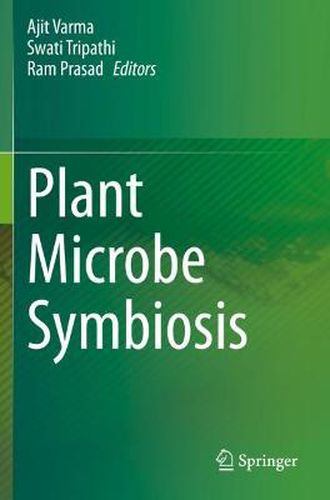Readings Newsletter
Become a Readings Member to make your shopping experience even easier.
Sign in or sign up for free!
You’re not far away from qualifying for FREE standard shipping within Australia
You’ve qualified for FREE standard shipping within Australia
The cart is loading…






This title is printed to order. This book may have been self-published. If so, we cannot guarantee the quality of the content. In the main most books will have gone through the editing process however some may not. We therefore suggest that you be aware of this before ordering this book. If in doubt check either the author or publisher’s details as we are unable to accept any returns unless they are faulty. Please contact us if you have any questions.
This book provides an overview of the latest advances concerning symbiotic relationships between plants and microbes, and their applications in plant productivity and agricultural sustainability.
Symbiosis is a living phenomenon including dynamic variations in the genome, metabolism and signaling network, and adopting a multidirectional perspective on their interactions is required when studying symbiotic organisms.
Although various plant-microbe symbiotic systems are covered in this book, it especially focuses on arbuscular mycorrhiza (AM) symbiosis and root nodule symbiosis, the two most prevalent systems. AM symbiosis involves the most extensive interaction between plants and microbes, in the context of phylogeny and ecology. As more than 90% of all known species of plants have the potential to form mycorrhizal associations, the productivity and species composition, as well as the diversity of natural ecosystems, are frequently dependent upon the presence and activity of mycorrhizas.
In turn, root nodule symbiosis includes morphogenesis and is formed by communication between plants and nitrogen-fixing bacteria. The biotechnological application of plant-microbe symbiosis is expected to foster the production of agricultural and horticultural products while maintaining ecologically and economically sustainable production systems.
Designed as a hands-on guide, this book offers an essential resource for researchers and students in the areas of agri-biotechnology, soil biology and fungal biology.
$9.00 standard shipping within Australia
FREE standard shipping within Australia for orders over $100.00
Express & International shipping calculated at checkout
This title is printed to order. This book may have been self-published. If so, we cannot guarantee the quality of the content. In the main most books will have gone through the editing process however some may not. We therefore suggest that you be aware of this before ordering this book. If in doubt check either the author or publisher’s details as we are unable to accept any returns unless they are faulty. Please contact us if you have any questions.
This book provides an overview of the latest advances concerning symbiotic relationships between plants and microbes, and their applications in plant productivity and agricultural sustainability.
Symbiosis is a living phenomenon including dynamic variations in the genome, metabolism and signaling network, and adopting a multidirectional perspective on their interactions is required when studying symbiotic organisms.
Although various plant-microbe symbiotic systems are covered in this book, it especially focuses on arbuscular mycorrhiza (AM) symbiosis and root nodule symbiosis, the two most prevalent systems. AM symbiosis involves the most extensive interaction between plants and microbes, in the context of phylogeny and ecology. As more than 90% of all known species of plants have the potential to form mycorrhizal associations, the productivity and species composition, as well as the diversity of natural ecosystems, are frequently dependent upon the presence and activity of mycorrhizas.
In turn, root nodule symbiosis includes morphogenesis and is formed by communication between plants and nitrogen-fixing bacteria. The biotechnological application of plant-microbe symbiosis is expected to foster the production of agricultural and horticultural products while maintaining ecologically and economically sustainable production systems.
Designed as a hands-on guide, this book offers an essential resource for researchers and students in the areas of agri-biotechnology, soil biology and fungal biology.